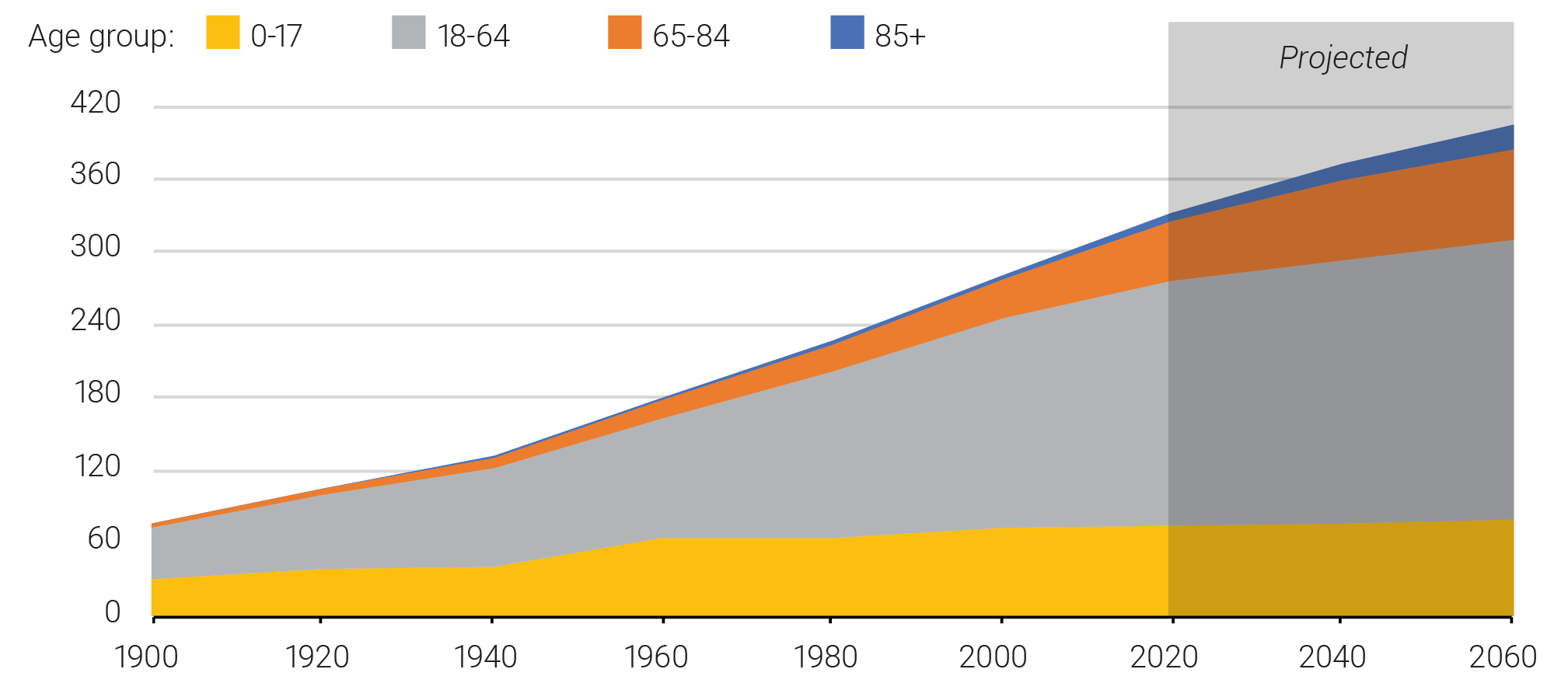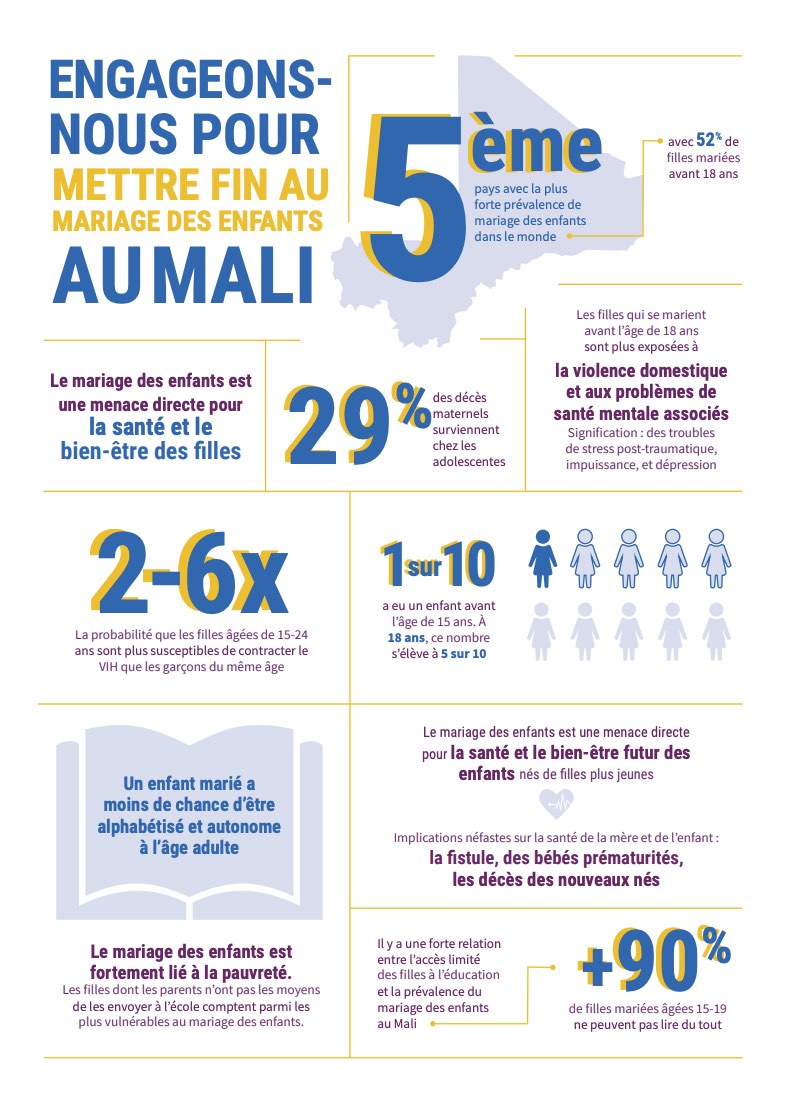Project:
Health Policy Plus (HP+)
Advocacy Tools to End Gender-Based Violence in Mali
Although Mali has ratified most major international and regional human rights treaties, and its constitution defends women’s rights, the country has yet to formally pass a law criminalizing gender-based violence (GBV).
View Details
Array
(
[ID] => 7982
[id] => 7982
[title] => 083018-Mali-Child-Marriage-Infographic-FRTM
[filename] => 083018-Mali-Child-Marriage-Infographic-FRTM.jpg
[filesize] => 187101
[url] => https://www.prb.org/wp-content/uploads/2018/08/083018-Mali-Child-Marriage-Infographic-FRTM.jpg
[link] => https://www.prb.org/resources/les-raisons-pour-lesquelles-nous-avons-besoin-dune-loi-contre-les-violences-basees-sur-le-genre-au-mail/083018-mali-child-marriage-infographic-frtm/
[alt] => Engageons-nous pour mettre fin au mariage des enfants au Mali
[author] => 15
[description] => Engageons-nous pour mettre fin au mariage des enfants au Mali
[caption] => Mettre Fin au Mariage des Enfants au Mali
[name] => 083018-mali-child-marriage-infographic-frtm
[status] => inherit
[uploaded_to] => 7980
[date] => 2020-12-12 20:33:02
[modified] => 2020-12-12 20:41:10
[menu_order] => 0
[mime_type] => image/jpeg
[type] => image
[subtype] => jpeg
[icon] => https://www.prb.org/wp-includes/images/media/default.png
[width] => 789
[height] => 1118
[sizes] => Array
(
[thumbnail] => https://www.prb.org/wp-content/uploads/2018/08/083018-Mali-Child-Marriage-Infographic-FRTM-580x315.jpg
[thumbnail-width] => 580
[thumbnail-height] => 315
[medium] => https://www.prb.org/wp-content/uploads/2018/08/083018-Mali-Child-Marriage-Infographic-FRTM.jpg
[medium-width] => 212
[medium-height] => 300
[medium_large] => https://www.prb.org/wp-content/uploads/2018/08/083018-Mali-Child-Marriage-Infographic-FRTM-768x1088.jpg
[medium_large-width] => 768
[medium_large-height] => 1088
[large] => https://www.prb.org/wp-content/uploads/2018/08/083018-Mali-Child-Marriage-Infographic-FRTM.jpg
[large-width] => 723
[large-height] => 1024
[1536x1536] => https://www.prb.org/wp-content/uploads/2018/08/083018-Mali-Child-Marriage-Infographic-FRTM.jpg
[1536x1536-width] => 789
[1536x1536-height] => 1118
[2048x2048] => https://www.prb.org/wp-content/uploads/2018/08/083018-Mali-Child-Marriage-Infographic-FRTM.jpg
[2048x2048-width] => 789
[2048x2048-height] => 1118
[huge] => https://www.prb.org/wp-content/uploads/2018/08/083018-Mali-Child-Marriage-Infographic-FRTM.jpg
[huge-width] => 789
[huge-height] => 1118
[small] => https://www.prb.org/wp-content/uploads/2018/08/083018-Mali-Child-Marriage-Infographic-FRTM.jpg
[small-width] => 789
[small-height] => 1118
[tiny] => https://www.prb.org/wp-content/uploads/2018/08/083018-Mali-Child-Marriage-Infographic-FRTM.jpg
[tiny-width] => 789
[tiny-height] => 1118
[smaller] => https://www.prb.org/wp-content/uploads/2018/08/083018-Mali-Child-Marriage-Infographic-FRTM-768x1088.jpg
[smaller-width] => 768
[smaller-height] => 1088
[smallest] => https://www.prb.org/wp-content/uploads/2018/08/083018-Mali-Child-Marriage-Infographic-FRTM-416x589.jpg
[smallest-width] => 416
[smallest-height] => 589
[blurry] => https://www.prb.org/wp-content/uploads/2018/08/083018-Mali-Child-Marriage-Infographic-FRTM-204x289.jpg
[blurry-width] => 204
[blurry-height] => 289
[banner_img] => https://www.prb.org/wp-content/uploads/2018/08/083018-Mali-Child-Marriage-Infographic-FRTM-789x690.jpg
[banner_img-width] => 789
[banner_img-height] => 690
[news_thumb] => https://www.prb.org/wp-content/uploads/2018/08/083018-Mali-Child-Marriage-Infographic-FRTM-360x240.jpg
[news_thumb-width] => 360
[news_thumb-height] => 240
[media_thumb] => https://www.prb.org/wp-content/uploads/2018/08/083018-Mali-Child-Marriage-Infographic-FRTM-222x315.jpg
[media_thumb-width] => 222
[media_thumb-height] => 315
[pullquote_thumb] => https://www.prb.org/wp-content/uploads/2018/08/083018-Mali-Child-Marriage-Infographic-FRTM-335x300.jpg
[pullquote_thumb-width] => 335
[pullquote_thumb-height] => 300
[team_thumb] => https://www.prb.org/wp-content/uploads/2018/08/083018-Mali-Child-Marriage-Infographic-FRTM-265x270.jpg
[team_thumb-width] => 265
[team_thumb-height] => 270
[team_small] => https://www.prb.org/wp-content/uploads/2018/08/083018-Mali-Child-Marriage-Infographic-FRTM-360x360.jpg
[team_small-width] => 360
[team_small-height] => 360
[pdf] => https://www.prb.org/wp-content/uploads/2018/08/083018-Mali-Child-Marriage-Infographic-FRTM-170x245.jpg
[pdf-width] => 170
[pdf-height] => 245
[gform-image-choice-sm] => https://www.prb.org/wp-content/uploads/2018/08/083018-Mali-Child-Marriage-Infographic-FRTM.jpg
[gform-image-choice-sm-width] => 212
[gform-image-choice-sm-height] => 300
[gform-image-choice-md] => https://www.prb.org/wp-content/uploads/2018/08/083018-Mali-Child-Marriage-Infographic-FRTM.jpg
[gform-image-choice-md-width] => 282
[gform-image-choice-md-height] => 400
[gform-image-choice-lg] => https://www.prb.org/wp-content/uploads/2018/08/083018-Mali-Child-Marriage-Infographic-FRTM.jpg
[gform-image-choice-lg-width] => 423
[gform-image-choice-lg-height] => 600
)
)
Download
(0.2 MB)







